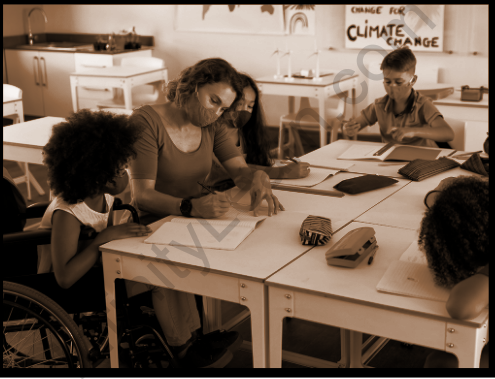Table of Contents

The idea of a trauma-informed approach to teaching is a vital development in the international of special training. With such a lot of college students struggling to conquer worrying reviews, it’s miles essential that instructors recognize how to efficiently respond to the ensuing challenging behaviours.
Special schooling, additionally called special wishes schooling, is the education of youngsters who fluctuate socially, mentally, or bodily from the common to such a quantity that they require changes of regular college practices. Special training serves kids with emotional, behavioural, or cognitive impairments or with highbrow, listening to, imaginative and prescient, speech, or learning disabilities; gifted kids with advanced educational abilities; and children with orthopaedic or neurological impairments.
WHY DO WE NEED A TRAUMA-INFORMED APPROACH TO EDUCATION?
Almost half of all kids, and more or fewer two-thirds of adults within the United States, have endured at the least one Adverse Childhood Experience (ACE) within the shape of abuse, forget about, or family disorder. Being situation to trauma at a young age may additionally have a detrimental effect on courting and agree on with-building, the ability to manipulate conduct, cognition, and plenty of different components of early life improvement.
The bad side results associated with trauma publicity often appear in schoolroom settings as disruptive conduct or negative instructional overall performance. When instructors are not aware of the supply of those consequences or skilled in a trauma-knowledgeable method to schooling, it’s far simply not possible for them to help college students conquer the one’s challenges.
HOW DOES TRAUMA AFFECT YOUTH?
Exposure to trauma has an overwhelming and terrible influence on the improvement of a toddler. In essence, it rewires the brain to exist in a prolonged nation of survival mode. As one trauma-informed teacher notes, “the primal part of their mind can grow to be more potent due to the fact youngsters who’ve experienced complex trauma spend extra time within the combat, flight, or freeze. Our bodies are frequently flooded with cortisol. This isn’t conducive to study room gaining knowledge due to the fact we want our students which will get entry to their frontal cortex.” This can disrupt the normal improvement of the subsequent abilities:
- Critical questioning
- Executive function
- Regulating emotions
- Language
It is not any surprise that the academic success and social/emotional health of kids uncovered to trauma will maximum in all likelihood lag at the back of their friends. The extra disturbing events an infant is exposed to, the more excessive their demanding situations might be.
Students who have endured 3 or extra Adverse Childhood Experiences are at precise disadvantages and are:
- More probable to fail a grade
- More frequently suspended or expelled
- Likely to attain a decrease on standardized exams
- More at risk of dropping out of college
Additionally, because their behaviour mimics that of students with disabilities, these college students are regularly assigned to important training programs. If teachers lack knowledge of trauma and its impact on kids, distinguishing fabricated neurodiversity from a reaction to trauma may be quite difficult, not to mention determining a way to competently and as it should be aid the scholar. This is exactly why a trauma-informed approach to teaching is so vital.
WHAT IS TRAUMA-INFORMED TEACHING?
Trauma-knowledgeable coaching is extra about a shift inside the normal mindset of an educator than the implementation of recent techniques. According to Matthew Portell, the primary of the world over diagnosed trauma-informed faculty, this exercise includes “approaching schooling with an understanding of the physiological, social, emotional, and educational effects of trauma and adversity on our college students.”
To effectively implement a trauma-knowledgeable technique, instructors must renowned the effect of beyond trauma on a scholar, determine every baby’s precise wishes, and try and meet those needs. The secret’s to assist students even as attempting to build trusting and nurturing relationships with them. Teachers need to “apprehend the impact of everyday effective interactions and affirmations for our college students.” Without spotting a baby’s stress beyond, it’s far not possible to help them overcome it.
There are easy and effective techniques that instructors and other academic professionals can use whilst respond to tough behaviour from students with worrying pasts. Start with first building trusting relationships, after which establishing the gaining knowledge of the environment as a safe area.
- Use visual schedules or everyday agendas to create a consistent recurring.
- Be organized to handle surprising or unstable responses from students.
- Find herbal situations in which students can succeed and construct self-assurance.
- Do no longer exile college students for elaborate or hard behaviour.
- Be aware of capacity triggers and try to lessen or eliminate their prevalence.
- Create possibilities wherein college students can help their friends and construct relationships.
- Taking a trauma-informed technique to school will almost virtually make a significant distinction for college kids who’ve persisted in Adverse Childhood Experiences.
FAQ’s
What is trauma-informed mastering in special education?
In its most effective shape, trauma-knowledgeable methods represent a shift in an individual's mindset while operating with students, acknowledging the large and significant impact of trauma on behaviour, getting to know, and social-emotional functioning.
What are the three components needed for a trauma-knowledgeable school?
The competencies are self-consciousness, social focus, accountable decision making, self-control, and dating talents. The specific coaching of each of those abilities is crucial in developing a conventional trauma-informed technique in colleges.
What are the five characteristics of a trauma-informed lecture room environment?
Creating a trauma-knowledgeable studying environment (social/emotional abilities and health). Being culturally responsive. Integrating emergency management & crisis reaction. Understanding and addressing group of workers self-care and secondary demanding stress.
Why is unique training important?
Special training is of first-rate significance for youngsters with learning disabilities, as it offers them the opportunity to get great schooling consistent with their unique needs. Special schooling permits every pupil to advantage a high degree of independence and attain their complete capacity







